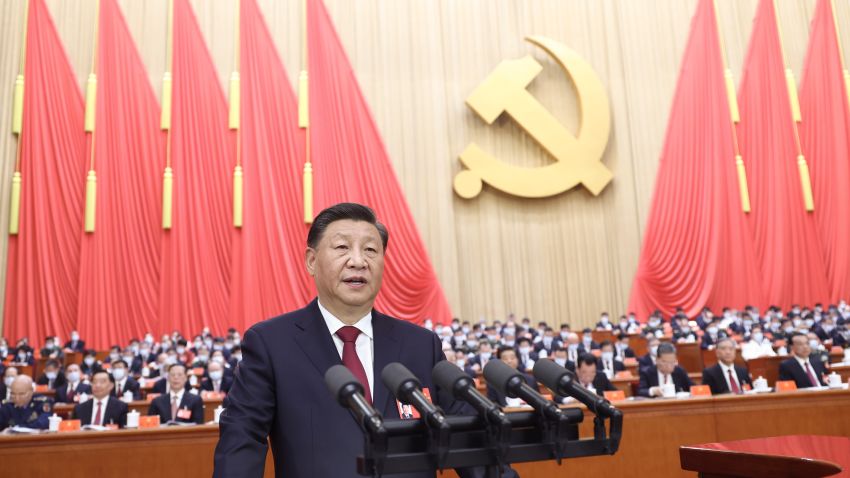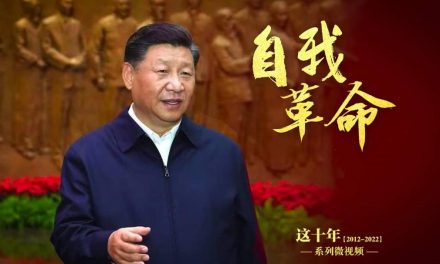By International Campaign for Tibet
The 20th Party Congress of the Chinese Communist Party held between Oct. 16 and 22, 2022, laid out priorities for the next five years that will profoundly impact the lives of the Tibetans living under China’s rule. The Party Congress deflated the little optimism that some had for political liberalization, as it regressed all the major political reforms in China in the post-Mao period. Xi Jinping begins his third term in office with an indefinite tenure and a firm grip on power.
While no new policy guidelines were introduced during the Congress, Xi Jinping made clear his priorities and intensification of the existing policies, as well as the central task of the CCP. In Xi’s own words:
From this day forward, the central task of the Communist Party of China will be to lead the Chinese people of all ethnic groups in a concerted effort to realize the Second Centenary Goal of building China into a great modern socialist country in all respects and to advance the rejuvenation of the Chinese nation on all fronts through a Chinese path to modernization.
From the trends observed in the past decade of Xi’s rule and the goals set for the future, it is highly discernable that the Tibetans as an “ethnic minority” in China will undergo intensified and accelerated assimilation and heavy ideological indoctrination during Xi’s indefinite rule. The uptick on security, nationalism and repression since 2012, when China’s “New Era” officially began, is indicative of the worsening of situation in the remaining 27 years of the “New Era” until the second centenary goal is achieved by 2049.
Key words analysis
An analysis of key words in Xi Jinping’s political work report to the 20th Party Congress reveal that China’s decades-old policy planks of security and development remain unchanged.
However, the focus on security has increased sharply when the 20th Party Congress report is compared to the 19th Party Congress report from 2017. The word “security” appears 80 times in the 20th report (English version) versus 43 in the 19th Congress report. The frequency of the term “national security” in particular has increased to 29 against 14 in the 19th Congress report.
The International Campaign for Tibet notes that Beijing has started to frame Tibet as a national security issue, with Xi Jinping building an all-encompassing national security framework since the third plenum (meeting of the party central committee, China’s third highest body, the other two being the Politburo and Politburo standing committee) of the 18th Party Congress in 2013. The increased emphasis on national security in the 20th Congress report is expected to inevitably lead to firmer security policies in Tibet.
Another notable theme in the 20th Congress Report is nationalism. This is reflected in increased frequency of the terms “unity” and “Chinese nation.” Unity is mentioned 21 times (41 in the Chinese version) against 17, whereas Chinese nation is mentioned 25times (26 in Chinese) versus 21 times in the 20th and 19th Party Congress reports respectively. In the background of a stagnating Chinese economy following three decades of double-digit GDP growth and worsened by sweeping COVID lockdowns, the party’s turn toward nationalism aims to offset its decline in legitimacy in the shadow of an anticipated declining economy. Shoring up nationalism as its legitimacy currency appears to lead to widening the gap between Han Chinese and Tibetans and potentially increased Chinese hate toward “minorities” like Tibetans as collateral damage.
Parsing through the political discourse, past and present, there is little doubt that Tibetans and others who are categorized as “ethnic minorities” will be coerced into becoming “sons and daughters of the Chinese nation” and developing “a strong sense of community for the Chinese nation.” In calling for strengthening “the great unity of the Chinese people of all ethnic groups and the great unity of all the sons and daughters of the Chinese nation” for the “China Dream” of the “rejuvenation of the Chinese nation,” the policy guideline is meant to accelerate the assimilation of Tibetans and other minorities under CCP rule.
Rural revitalization strategy launched at the 19th Congress is reiterated in Xi’s work report to the 20th Congress as well. According to Xi, “advancing rural revitalization across the board is the most challenging and arduous tasks we face in building a modern socialist China in all respects remain in our rural areas.” Large-scale development of the western region by placing “sound systems, mechanisms, and policies for promoting integrated urban-rural development” was instructed to the delegates of the 20th Congress.
This will have an impact on Tibet. The party claims that the rural revitalization strategy empowers rural residents to become shareholders in cooperatives by consolidating their properties to attract investors. Although in theory the farmers maintain their land tenure rights, even though all rural land legally belongs to the state, wealthy Chinese investors’ factories degrade the soil and make the farmers’ finances unsustainable once they pull out their investment after their profit margins drop. The urban-rural integration development model at the heart of rural revitalization strategy is an unsustainable development model in the long run which keeps the farmers poor but the rich richer.
In Tibet, rural revitalization strategy is pointedly political. In days prior to and during the 20th Congress, recruitment notices for rural revitalization cadres listed political criteria for fresh college graduate job aspirants. The rural revitalization cadre recruitment notices for Shigatse (Chinese: Rikaze), Lhasa (Lasa) and Nagchu (Naqu) required applicants to be “anti-Dalai Lama,” “opposing separatism,” “anti-Dalai clique” and “safeguarding the motherland’s reunification.”
Leaders with roles impacting Tibet
Wang Huning: Ideologue in Chief
Indoctrination of Tibetans and assimilation of Tibetans in the “Chinese nation” have been the perpetual goal of the CCP for decades through both hard and soft methods. During Xi’s unprecedented third term and beyond, there is little doubt that the pace of indoctrination and assimilation will accelerate to an unseen level. The 20th Congress sent multiple signals to this effect.
With China’s ideologue in chief, Wang Huning, who was the fourth to walk up to the stage during the new top party leadership revelation event, the expectation is that he will be overseeing the party’s United Front and ethnic policies. It is almost certain that Wang will be declared the new Chairman of the Chinese People’s Political Conference (CPPCC) during the upcoming “two sessions” in spring 2023. As the CCP’s Politburo Standing Committee member in charge of the United Front and Chairman of the CPPCC, Wang Huning directs China’s Central Committee Tibet Work Coordination Group.
China watchers observe that Wang Huning is the chief ideologue of the Communist Party and the architect of political ideologies of the Party leaders. The former academic was recruited into the party in the mid-1990s by Jiang Zemin’s “Shanghai Gang,” a rival faction of Xi Jinping. Wang’s rise and retention of his leadership position serving under three paramount leaders of rival factions is testament to his political shrewdness and accomplishments in three decades. He was promoted as one of the Politburo standing committee members during the 19th Party Congress.
While Wang Huning takes the CCP’s number four position, his relatively liberal predecessor and a member of the diminished Communist Youth League, Wang Yang, was demoted after serving one term in the highest decision-making body. Once speculated to be the next premier of China, Wang Yang did not even find a spot in the 205 member-strong central committee of the CCP. In a clear indication of dissatisfaction with Wang Yang’s work, the official party mouthpiece People’s Daily on Oct 25 said that, “The leadership positions of the Party and the state are not ‘iron chairs,’ and those who meet the age requirements do not necessarily need to continue to be nominated.”
Shi Taifeng: New Head of United Front Work Department
As the United Front Work Department (UFWD) plays a pivotal role in the Party’s policies on Tibet, it is interesting to see that the newly-inducted politburo member Shi Taifeng was appointed as the new head of UFWD. His appointment came a week after the Party Congress ended.
Shi’s appointment as the new head of the UFWD indicates intensified hardline policies on Tibetans and other “ethnic minorities”.
He was appointed the Party Secretary of Inner Mongolia Autonomous Region in 2019 to execute Xi’s plan to tighten control over the frontier region. During his leadership as the Party Secretary, student protests erupted in Inner Mongolia to protect Mongolian culture and language. Shi’s order for Chinese medium instruction and textbooks in schools resulted in students and parents protests over the policy implementation.
Pan Yue: The rising ideologue
In the months leading up to the 20th Party Congress, the CCP sent a clear signal of its policy priority for China’s “ethnic minorities.” In June 2022, a rising ideologue, Pan Yue, was appointed as the Secretary of the Party Leadership Group and Director of the National Ethnic Affairs Commission. The commission under the United Front Work Department since 2018 oversees affairs relating to China’s “ethnic minorities.” After 1954, when Li Weihan, the first ethnic Chinese, completed his tenure, Pan Yue is only the third head of the Commission who is of ethnic Chinese origin. In between seven others were from “ethnic minority” communities. Pan Yue succeeded the second ethnic Chinese head, Chen Xiaojiang, who was appointed as the head in December 2020.
On top of his new designation, Pan continues to hold his titles as the Deputy Minister of the United Front Work Department of the Central Committee and as Director of the Overseas Chinese Affairs Office of the State Council since 2020. Pan Yue’s rise is notable as he was elevated to the Central Committee of the CCP during the 20th Congress.
Pan Yue is an ideologue focused on justifying expansion of China and assimilation of peoples as integration into China. His essays (part 1 and 2) published prior to his appointment as the Director of the NEAC reasons the superiority of Chinese civilization over Western civilizations due to its “integration” pull. Contrasting ancient European empires to the Chinese empire, he wrote, “European barbarians practiced ethnic division, coupled with religious contradictions, which intensified ethnic estrangement, resulting in the continuous differentiation of ethnic groups.” Citing another Chinese author, he justifies the superiority of China as expansion by integration whereas disintegration of Europe since the Greek empire.
Since his appointment as the Director of the NEAC, Pan Yue repeatedly stresses “forging a sense of community of the Chinese nation and strengthening the construction of the community of the Chinese nation” during his official presence at “ethnic minority” events. There is little doubt that his goal is to drive and “integrate” Tibetans and other minority cultures into Chinese culture in the Chinese nation.
Party Secretaries in the Central Committee directly impacting lives of Tibetans
The Party Secretary of Tibet Autonomous Region, Wang Junzheng, is included in the Central Committee of the CCP per the precedent of having the TAR Party Secretary in the Central Committee. Wang served as an alternate member of the Central Committee during the 19th Congress.
The Party Secretaries of Qinghai (where most of Amdo area of Tibet is located) Xin Changxing, Sichuan (parts of Kham and Amdo area are incorporated) Wang Xiaohui, Gansu (part of Amdo is incorporated) Yin Hong, and Yunnan (part of Kham area of Tibet is incorporated) Wang Ning also find a place in the 20th Party Central Committee.
Tibetans in the top leadership
In the CCP’s leadership pyramid, ethnic Chinese leaders sweepingly dominate the all-powerful Politburo standing committee and the larger Politburo. However, nine “ethnic minorities” were included in the 205 member-strong Central Committee of the CCP. Tibet Autonomous Region Chairman Yan Jinhai—who according to his official biography is a Tibetan—is the only Tibetan in the Central Committee. In the 19th Party Congress there were two Tibetans in the Central Committee. Contrary to expectations, Norbu Thondup, who was an alternate in the 19th Party Congress did not find a place in the 20th Party Congress lineup.
Three other Tibetans were listed in the 171 alternate members of the Central Committee. No Tibetan leaders from Gansu, Sichuan and Yunnan were included. The Tibetan alternate members of the Central Committee are:
- Karma Tseten, Tibet Autonomous Region United Front
- Phurbu Dhondup, Lhasa Mayor
- Tsering Thar, Qinghai Deputy Governor
In the 19th Party Congress, there were only two Tibetans as alternates.
None of these Tibetan officials have any pan-Tibetan influence.
Propaganda and security buildup
In the leadup to and during the 20th National Congress, the Party scaled up propaganda and security measures all over Tibet, penetrating all levels of the Tibetan society.
The central theme of the propaganda was to drive up loyalty to the party, its leaders and the Chinese nation. The party featured Dolkar (Zhuoga) of Yumed (Yumai) Township, Lhoka (Shannan) City in the TAR, who was a delegate at the Party Congress, as the star propagandist. The official camera team spotlighted her prominently during the congress, and state media ran print and video features on her. The central theme of propaganda surrounding Dolkar was loyalty to Xi Jinping and the Chinese nation.
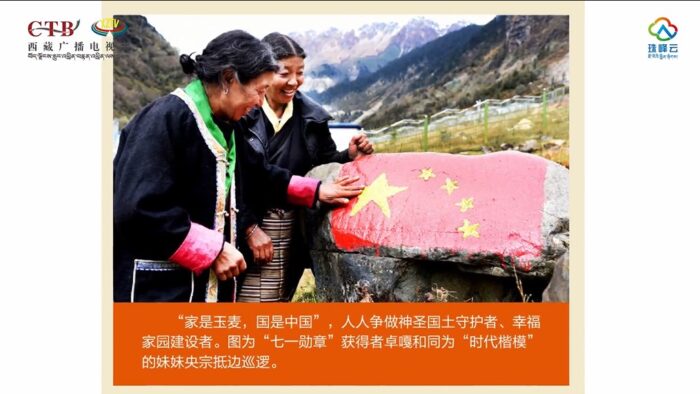
Dolkar is often shown lovingly touching or dusting off the Chinese flag painted on rocks in her hometown (Source: XZTV)
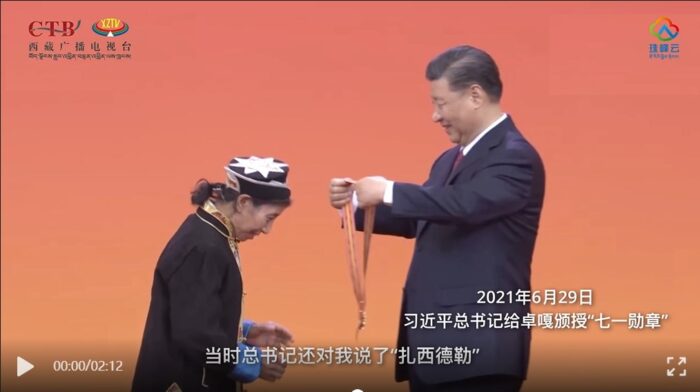
Xi Jinping presenting Dolkar the “July 1 medal” in 2021 commemorating the founding day of the CCP. (Source: XZTV)
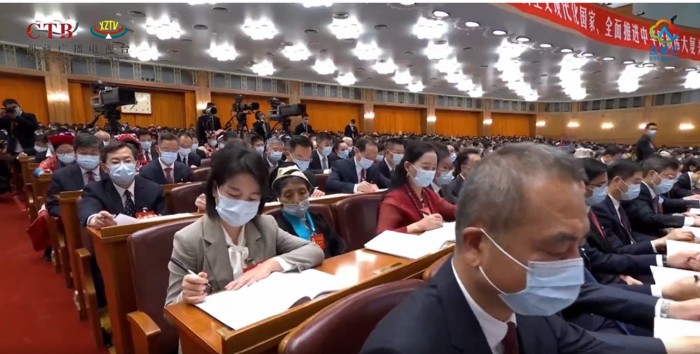
Dolkar at the 20th Party Congress. “General Secretary, we will always go with you!” reads the title of a state media video feature on her. (Source: XZTV)
The propaganda department of the CCP reached deep down in all levels of Tibetan society. For example, 7,500 farmers and herdsman in Nyarong (Xinlong) County in Sichuan Province received “the five ones civilized gifts” according to the Kardze Prefecture Party Committee. The five gifts were a Chinese national flag, a portrait of party leaders, a pledge to build a socialist spiritual civilization, a copy of village rules and regulations and a copy of the five-year plan on legal awareness published by the Party Central Committee and State Council in June 2021.
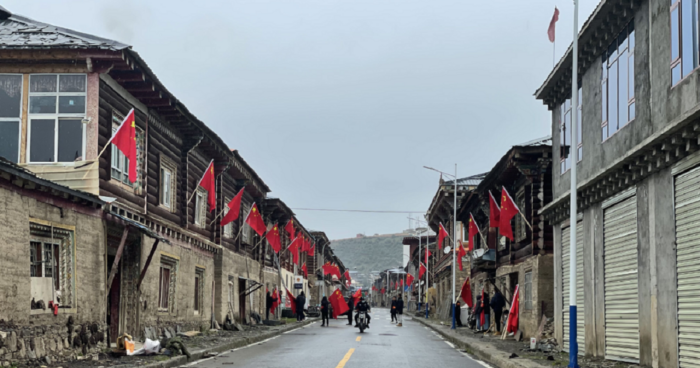
Households ordered to hoist the Chinese national flag in Larima, Nyarong County.
Propaganda events were also arranged for the monastics in Tibet. For example, a three-day calligraphy and butter sculpture event on the theme of the Party Congress to reflect “the love of the party, the country and the religion” was organized for the monastic community in Serthar county, Sichuan.
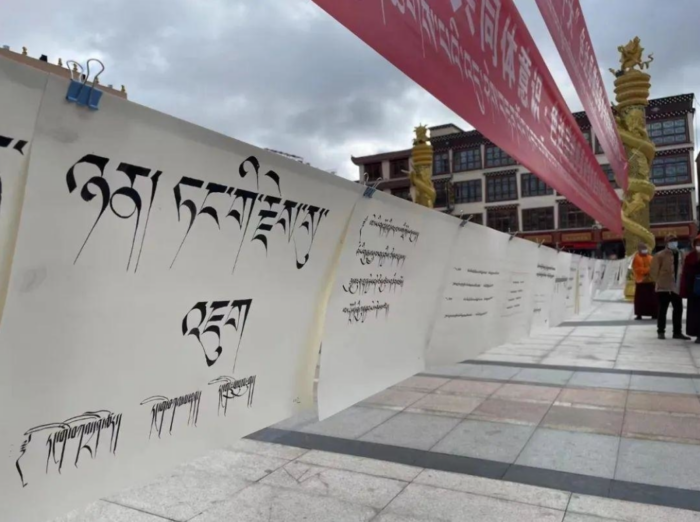
“Feel gratitude to the Party, Obey the Party, Follow the Party” reads the first calligraphy exhibit
In Gongjo county (Gongjue) in Chamdo (Changdu) city in the TAR, Tibetan “thangka” (Buddhist scrolls) painters were tasked to create a joint painting to “welcome the Party’s 20th National Congress” to “express the gratitude of the Tibetan people to the Communist Party of China.”
Alongside the propaganda blitz, state law enforcement agencies stepped up security prior to and during the Congress for “stability maintenance.”
The Ministry of Public Security in a notice dated September 19 ordered strengthening the security and stability maintenance work in the period of 20th National Congress of the CCP.
The Party Committee of the TAR convened the region’s stability maintenance conference on September 26 to “do everything possible for the security and stability maintenance work of the 20th Party Congress”. Liu Jiang, member of the Standing Committee of the Autonomous Region Party Committee and Secretary of the Political and Legal Committee instructed that “it is necessary to strictly supervise and inspect…keep and eye on key areas, discover hidden problems in a timely manner…ensure the implementation of various measures and responsibilities with iron discipline.”
Malho (Huangnan) Prefecture (in Qinghai Province) Public Security Bureau conducted prefecture-wide unified “anti-terrorist” drills beginning on Sept. 28. The Party Secretary Zhu Zhanmin instructed the security forces “for combat readiness … to deter extremist terrorist forces … and welcome the party’s 20th National Congress.” The 580-member team began its drill at Rebkong (Tongren) county, a Tibetan majority county known for its language activism.
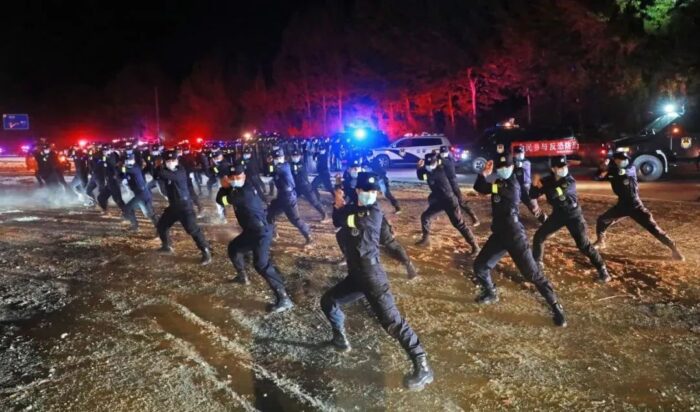
Security officers displaying their martial arts skill
Jin Lei, the Party Secretary for Political and Legal Commission of Sichuan Province visited Dartsedo (Kangding), Drango (Luhuo), Serthar (Seda) in Kardze Tibetan Autonomous Prefecture from Sept. 20 to 23 to inspect the implementation and deployment of Sichuan Provincial security and stability maintenance over the 20th Party Congress. Jin Lei ordered elimination of “separatist activities” and creation of political stability for the 20th National Congress.
Similar security measures were taken all over Tibet mostly overseen by county Party Secretary or Deputy Secretary.

